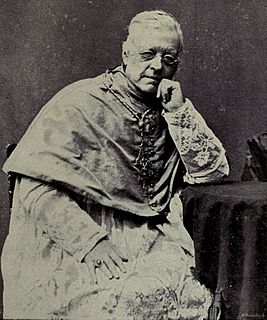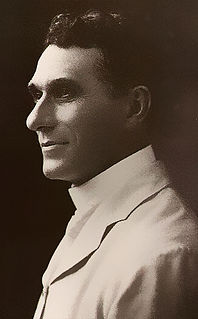A Quote by William Bernard Ullathorne
Whatever a man seeks, honors, or exalts more than God is the god of his idolatry.
Related Quotes
By His gracious condescension God became man and is called man for the sake of man and by exchanging His condition for ours revealed the power that elevates man to God through his love for God and brings God down to man because of His love for man. By this blessed inversion, man is made God by divinization and God is made man by hominization. For the Word of God and God wills always and in all things to accomplish the mystery of His embodiment.
Whatever man may stand, whatever he may do, to whatever he may apply his hand - in agriculture, in commerce, and in industry, or his mind, in the world of art, and science - he is, in whatsoever it may be, constantly standing before the face of God. He is employed in the service of his God. He has strictly to obey his God. And above all, he has to aim at the glory of his God.
Sunday morning in America is the greatest hour of idolatry in the whole week. Why? Because most people who are even worshiping God, are worshiping a God they don't know. They're worshiping a god that looks more like Santa Claus than the God of Scripture. They're worshiping a god that is a figment of their own imagination. They created a god in their own likeness and they worship the god they've made.
Offerings to propitiate the dead then were regarded as belonging to the class of funeral sacrifices, and these are idolatry. Idolatry, in fact, is a sort of homage to the departed, the one as well as the other is a service to dead men. Moreover, demons dwell in the images of the dead. ... this sort of exhibition has passed from honors of the dead to honors of the living; I mean, to quaestorships [financial overseers]and magistractes, to priestly offices of different kinds. Yet, since idolatry still cleaves to the dignity's name, whatever is done in its name partakes of its impurity.
The man who has given himself to his country loves it better; the man who has fought for his friend honors him more; the man who has labored for his community values more highly the interests he has sought to conserve; the man who has wrought and planned and endured for the accomplishment of God's plan in the world sees the greatness of it, the divinity and glory of it, and is himself more perfectly assimilated to it.
Orthodoxy is idolatry if it means holding the 'correct opinions about God' - 'fundamentalism' is the most extreme and salient example of such idolatry - but not if it means holding faith in the right way, that is, not holding it at all but being held by God, in love and service. Theology is idolatry if it means what we say about God instead of letting ourselves be addressed by what God has to say to us. Faith is idolatrous if it is rigidly self-certain but not if it is softened in the waters of 'doubt.
An idol is something that we look to for things that only God can give. Idolatry functions widely inside religious communities when doctrinal truth is elevated to the position of a false god. This occurs when people rely on the rightness of their doctrine for their standing with God rather than on God himself and his grace. It is a subtly but deadly mistake. The sign that you have slipped into this form of self-justification is that you become what the book of Proverbs calls a 'scoffer'.
If a man has no worries about himself at all for the sake of love toward God and the working of good deeds, knowing that God is taking care of him, this is a true and wise hope. But if a man takes care of his own business and turns to God in prayer only when misfortunes come upon him which are beyond his power, and then he begins to hope in God, such a hope is vain and false. A true hope seeks only the Kingdom of God... the heart can have no peace until it obtains such a hope. This hope pacifies the heart and produces joy within it.
The thing that was forfeited in the garden was regained. God gave him [Adam] dominion over the works of His hand. God made him His understudy, His king to rule over everything that had life. Man was master, man lived in the realm of god. He lived on terms of equality with God. God was a faith God. All God had to do was to believe that the sun was, and the sun was. All God had to do was to believe that the planets would be, and they were. Man belonged to God's class of being - a faith man, And he lived in the creative realm of God

































